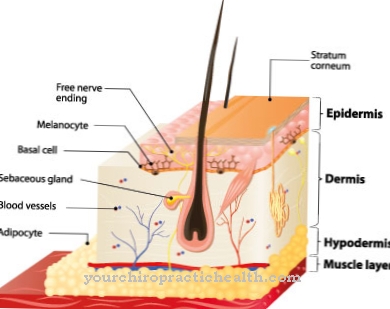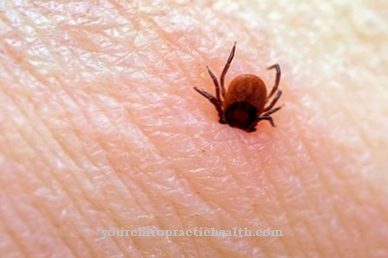A whole range of health impairments, which predominantly occur in advanced age, are popularly known as well as in scientific circles as Old age diseases designated.
What are old age diseases?

The diseases of old age are defined in such a way that they are typical only for people of old age and are common causes of death within these generations.
The diseases of old age do not only insist on the classic health restrictions and functional losses. They are also characterized by a more difficult healing process and a long latency period. This means that diseases of old age need a long time before they finally show up in the form of the corresponding symptoms.
In this context, age-related diseases are primarily about the high mortality rate, which is often due to the reduced self-healing powers. In old age, the ability to divide and thus the regenerative ability of the body's cells slows down, which determines the outcome of the old age disease to a very significant extent.
causes
The causes of old-age diseases are, on the one hand, the genetic disposition and individual disposition of each elderly person. These can be previous illnesses or an unhealthy lifestyle.
On the other hand, many external factors play an important role in aging diseases. In addition to the social situation and environmental influences, these are overloads or other influences. A whole series of age-related illnesses arise from the natural weakening of the organism, which quite often also affects the immune system.
This lack of or reduced resistance can be a trigger for an old-age disease. The way of life is a very central part of the causes of old-age diseases. An unbalanced, wrong diet, too much stress, little physical and mental balance contribute decisively to the development of old-age diseases.
You can find your medication here
➔ Medicines against memory disorders and forgetfulnessTypical & common diseases of old age
- frailty
- dementia
- Parkinson's
- Alzheimer
- Age-related hearing loss (presbycusis)
- Incontinence (urinary incontinence)
- Age-related macular degeneration
- Age spots
- Presbyopia (presbyopia)
- Old age forgetfulness
Symptoms, ailments & signs
The symptoms and complaints of age-related diseases can be very different, so that no general prediction is possible. They depend very much on the exact disease, but in any case have a very negative effect on the quality of life of the person affected and reduce it. Often there are restrictions in movement and thus in everyday life. The
Due to old age diseases, those affected are often dependent on the help of other people in their everyday lives. Furthermore, the diseases of old age often lead to poor eyesight or hearing problems, which in the worst case can lead to complete blindness or deafness. In some cases, there may also be dementia or general adeptness or forgetfulness that can make life difficult.
Thromboses also frequently occur, which can make movement of the person affected considerably more difficult. Other age-related diseases include incontinence, so that patients experience pain when urinating or defecating. Psychological complaints or depression are also common. Furthermore, many patients suffer from severe frailty, so that even minor injuries can lead to severe fractures. In addition to dementia, patients can also develop Parkinson's or Alzheimer's.
Diagnosis & course
The diagnosis of diseases of old age is not based only on modern technical devices. Even the self-observation or external observation of those affected can make a significant contribution to the determination of old-age diseases.
This fact plays an important role, for example, in the early detection of forms of dementia or Parkinson's disease. In addition, the elderly usually notice for themselves that they are suffering from an old-age disease due to physical complaints and impaired performance.
A multitude of diagnostic procedures can help to determine the age-related diseases exactly. This applies to both physical and mental illnesses. In addition to the laboratory tests of various endogenous substances, the radiological methods help to reveal typical age-related diseases. This applies in particular to symptoms that are not externally visible, which are associated with tumors, for example.
Complications
In the case of old-age diseases, the complications are very individual and cannot generally be predicted for a large group of people. Above all, they also depend on the person concerned and also differ in terms of their lifestyle. The diseases of old age usually affect the patient's life.
For example, older people can only carry out certain activities to a limited extent or have limited mobility. Aging diseases also include reduced eyesight and poor hearing. These diseases can only be treated to a very limited extent, for example through the use of glasses or a hearing aid. With such symptoms, the patient's life can resume a high quality.
In many cases, old-age diseases are those that require hospital treatment. The quality of life suffers as a result. It often happens that patients have few visitors and suffer from loneliness and depression. Social exclusion is also the result.
Age-related diseases can also be easily overcome with the help of care services, so that life appears worth living for those affected and is fun again. The complications with and without treatment depend heavily on the disease in question. However, complications during operations and anesthesia are more common in older people, as the body can no longer cope with them well.
When should you go to the doctor?
Aging diseases are degenerative diseases that usually do not go away. It is all the more important to consult an experienced specialist to make a diagnosis at the first signs of typical age-related diseases. Many diseases of old age are not recognized immediately or the patient waits a long time to see the doctor. As a result, when the doctor is called in, they are advanced and it is no longer possible to slow the process down or to give the patient symptomatic help.
On the other hand, the treatment of typical age-related diseases is easier if they are recognized in good time and at an early stage. Depending on how the diagnosis turns out, those affected can live almost symptom-free for some time through early drug treatment and the course of the disease is halted. However, these are highly effective drugs that can of course have side effects and that are not the only reason why they have to be prescribed by a doctor. Age-related diseases must also be checked regularly for their course.
Since they are expected to progress, the attending physician should know when this will happen so that they can respond in time with the right treatment. Many aging patients refuse to make life with an old-age disease much more comfortable despite the opportunity. If relatives or other close people suspect that age-related diseases could be involved, they should insist on a medical examination of the person concerned.
Doctors & therapists in your area
Treatment & Therapy
The treatment options for old-age diseases depend on their type and extent. In most cases of those affected, the treatment of old-age diseases is not always easy, because it is often a complex of different diseases.
In order to be able to treat the diseases of old age efficiently and sensibly, the most diverse medical disciplines work together. This also applies to the integration of rehabilitation facilities. In order to be able to treat and supervise age-specifically, completely new medical specialties have emerged.
These include, for example, geriatric psychology and geriatrics. Alternative medical treatment methods also make an effective contribution. In this context, homeopathy offers an enormous range of options for the successful treatment of holistic physical and mental illnesses in old age.
In addition, the medical facilities make a valuable contribution when it comes to treating very specific age-related diseases. In addition to the classic cardiovascular disorders and metabolic diseases, these are diseases of the visual or hearing organs and the skeletal system. It is also about age-appropriate care for people who suffer from old-age diseases and for whom a certain quality of life should be guaranteed.
The treatable disease complexes that occur in old age include dementia, so-called brain disorders, incontinence of the bladder or intestine, physical limitations as a result of a stroke and many other syndromes.
Outlook & forecast
The prognosis for typical age-related diseases is better, the earlier you looked at your health at a young age. Provision for old age includes sufficient exercise and sport as well as a healthy lifestyle and a diet rich in vital substances. Many so-called age-related diseases are preventable. Others can appear much later thanks to a good lifestyle.
According to official forecasts, old age diseases are on the rise. It is noticeable that younger and younger people can also suffer from so-called age-related diseases such as diabetes mellitus type 2 or osteoporosis. Dwindling bone density and decreasing muscle strength add to the age-related symptoms such as loss of vision and hearing. The outlook for severe old-age diseases is poor if the lifestyle was carefree and not very health-conscious.
Medical progress alone cannot guarantee against premature degeneration processes or serious illnesses in old age. Avoiding type 2 diabetes mellitus can significantly reduce the risk of strokes and heart attacks. Lots of exercise, healthy veins and arteries, and a healthy lifestyle do the same. Even age-related bladder weakness can be significantly alleviated by avoiding obesity or pelvic floor training.
Only a few diseases are real old age diseases. Most of the sequelae that occur years later are created at a young age. The prospects are therefore all the better if awareness of everyday health risks is acquired at an early stage.
You can find your medication here
➔ Medicines against memory disorders and forgetfulnessprevention
There are several ways to prevent old-age diseases that can be integrated into everyday life as a teenager. These are primarily a healthy lifestyle, plenty of exercise, self-awareness and a balanced diet. This prevents many risks of having to suffer from old age diseases.
Aftercare
Most age-related diseases cannot be completely cured once they have occurred. This means that aftercare cannot pursue the goal of preventing a recurrence. Dementia, Parkinson's, senile deafness, Alzheimer's and others continue to develop. Doctors can only try to eliminate complications and support those affected in their everyday lives. A loss of quality of life is inevitable.
Many departments work closely together in aftercare. Depending on the severity, doctors prescribe outpatient therapies and medication. Sometimes a rehabilitation measure is prescribed. Homeopathy offers a number of interesting holistic approaches. Every patient controls the success of a treatment from a young age.
Because a balanced diet and constant exercise reduce the risk of suffering from ailments in old age. Children and close relatives are also needed to avoid difficulties. You can reduce the mental effects of old-age diseases through mental training and joint activities.
Medicine has many suitable aids such as hearing aids to combat physical symptoms. In diagnostics, doctors use patient observations and interview people who are close to them. Mental tests, blood tests, x-rays and other things can verify complaints that have been presented. Nursing services help senior citizens in everyday life.
You can do that yourself
Old people often cannot access social networks such as family or neighborhood. To combat helplessness paired with loneliness, we particularly recommend community self-help: those affected can exchange ideas in groups with like-minded people. This form of social community is beneficial even for chronic illnesses.
In the case of diet-related diseases of old age, changing the food will alleviate the symptoms. In severe cases, a diet that is precisely tailored to the clinical picture helps. In the case of malnutrition, varied, balanced meals can help.
Dietary supplements and drinking food help to meet the increased need. Health food stores, drugstores and pharmacies have a large range and offer competent advice. A food diary provides an overview of the type, amount and time of meals.
A healthy, active lifestyle curbs many old-age diseases: abstaining from alcohol and tobacco products, an adequate diet, ensuring that you drink enough fluids, and regular physical and mental activity improve your overall condition. In addition to fitness and coordination training for seniors, there is also so-called “brain jogging” (sudokus, picture puzzles, quizzes). It playfully promotes memory and thinking skills.
In general, if you have any doubts, it is essential to consult a doctor or therapist. A serious illness can hide behind a supposedly natural burst of aging. The earlier a patient undergoes treatment, the greater the chance of success.

.jpg)

.jpg)


.jpg)




















